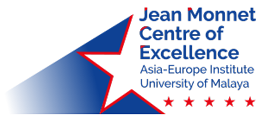
The Asia-Europe Conference is the annual flagship conference of the Asia-Europe Institute (AEI), University of Malaya. The institute, a brainchild of Tun Dr. Mahathir Bin Mohamad, was established in 1996 and is Malaysia’s leading forum for building bridges between Asia and Europe, linking academics, scholars, officials and students from the two regions.
The 2019 conference brought together eminent thinkers and academics from more than ten countries across Asia and Europe, who discussed a wide range of topics such as western and non-western approaches to international relations, European and Asian security architectures, the Belt and Road Initiative (BRI) and the emerging Indo-Pacific construct.
The conference began with the welcoming remarks by Professor Dr. Azirah Hashim, the Executive Director of AEI, who introduced the theme of the conference for the year 2019 i.e. “Europe in the New Asia: New Anxieties, New Constructs”. She highlighted the objective of the conference which was to deliberate on issues pertaining to political and security agendas in Asia and Europe.
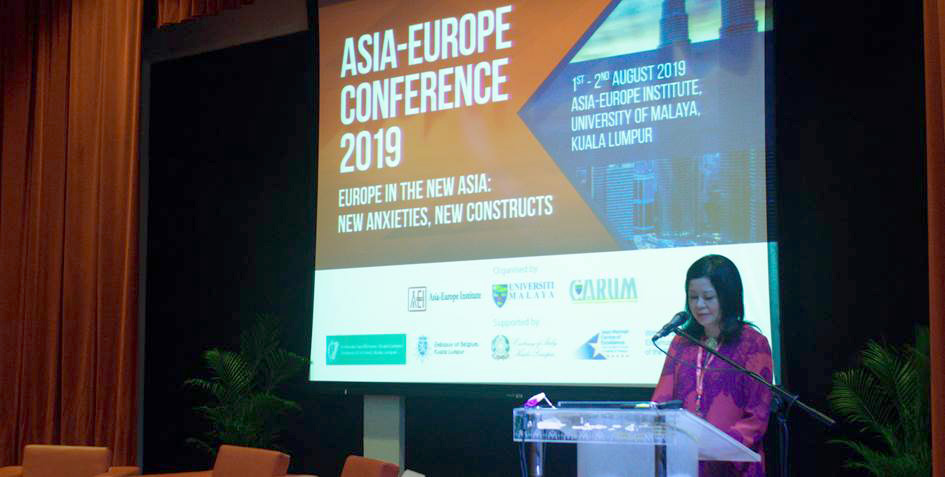 Prof. Dr. Azirah Hashim, Executive Director of Asia-Europe Institute, University of Malaya
Prof. Dr. Azirah Hashim, Executive Director of Asia-Europe Institute, University of MalayaThe opening remarks were given by YBhg. Datuk Dr. Abdul Rahim Hashim, the Vice Chancellor of the University of Malaya. He discussed the challenges faced by both Asia and Europe and how the centre of global gravity is shifting from what was formerly a very much Western-centric world - to an Asian-centric world order. Rapid economic development in Asia has led to the rise of middle powers - a phenomenon that is changing the way states engage with one another. He reiterated the role of the conference as a platform to pursue dialogue and foster understanding on key foreign policy themes and issues. Datuk Dr. Abdul Rahim also reiterated the importance of the University of Malaya as Malaysia’s leading academic institution, which is now ranked 70th globally and is at the forefront in promoting academic discussions on international issues.
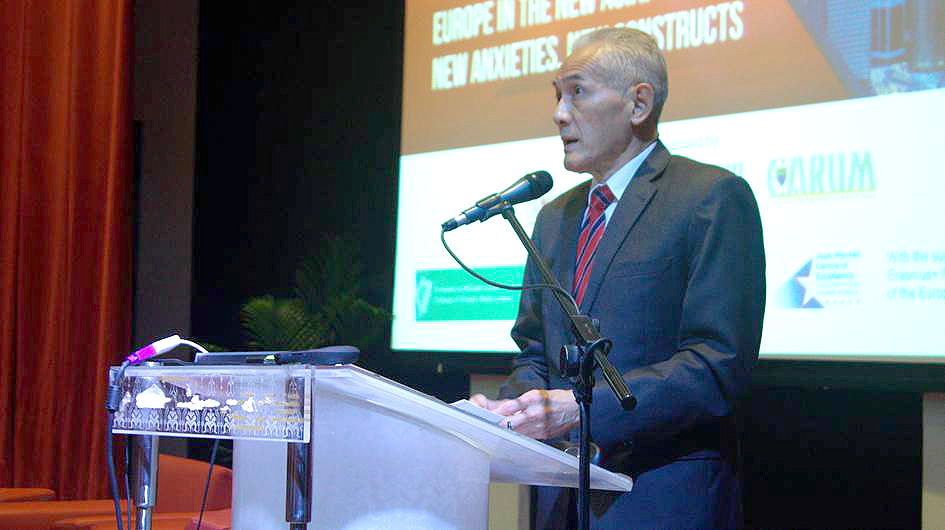 YBhg. Datuk Dr. Abdul Rahim Hashim, Vice Chancellor of the University of Malaya
YBhg. Datuk Dr. Abdul Rahim Hashim, Vice Chancellor of the University of MalayaYB Senator Liew Chin Tong, the Deputy Defence Minister of Malaysia, who is also an alumnus of the AEI, shared his enthusiasm about the conference in his keynote speech. In his speech titled, “Beyond US and China: What else can the Rest of Us Do?” He suggested that countries of the region have to look beyond the US and China and resurrect the idea of Asia. The new Asia, emerging from the post-Colonial and post-Cold War period, demands its own voice and identity. Similarly, globalisation has helped Europe evolve as a more multi-cultural entity.
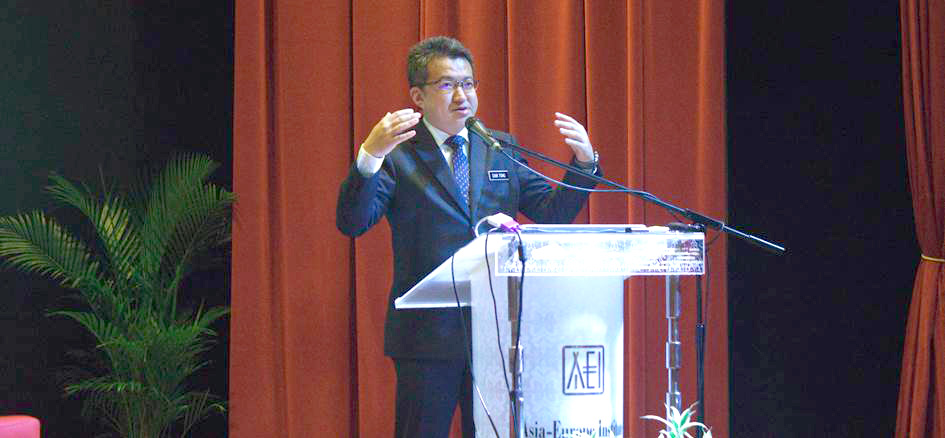 YB Senator Liew Chin Tong, Deputy Defence Minister of Malaysia
YB Senator Liew Chin Tong, Deputy Defence Minister of MalaysiaSenator Liew Chin Tong highlighted that Asia in general and ASEAN in particular can learn a few lessons from Europe, particularly on institutionalising international cooperation. He added that to start with, regional cooperation should be fostered beyond trade and defence issues. He further stated that Asia needs to resurrect the notion of its Asian identity by preserving and protecting it.
Some reflections were also offered on the geographical advantage that Malaysia enjoys. Being situated at the heart of Asia and surrounded by important sea passages, Malaysia needs to be aware of its identity as a maritime nation when locating itself in the regional sphere. According to Senator Liew, Malaysia needs to exploit its geographical advantages and position itself as a regional hub. Notwithstanding the above, Malaysia also faces a wide range of security challenges due to its central location.
Senator Liew pointed out that under the new government, Malaysia has adopted the “activist neutrality posture” allowing it to “punch above its weight” when negotiating with other countries. He further added that the “New Malaysia” does not conduct its foreign policy on a transactional basis. He also stressed that the “New Malaysia” should be aware of the emerging realities and focus on making itself a new hub for international cultural and academic exchanges. He emphasised that more funds should be given to institutions such as the AEI and Institute of China Studies (UM). He recommended strengthening area studies programmes and establishment of new research institutes such as a Middle East Studies Institute in the country. He emphasised that Malaysia can provide a viable platform for scholars to come together to exchange and discuss ideas and views.
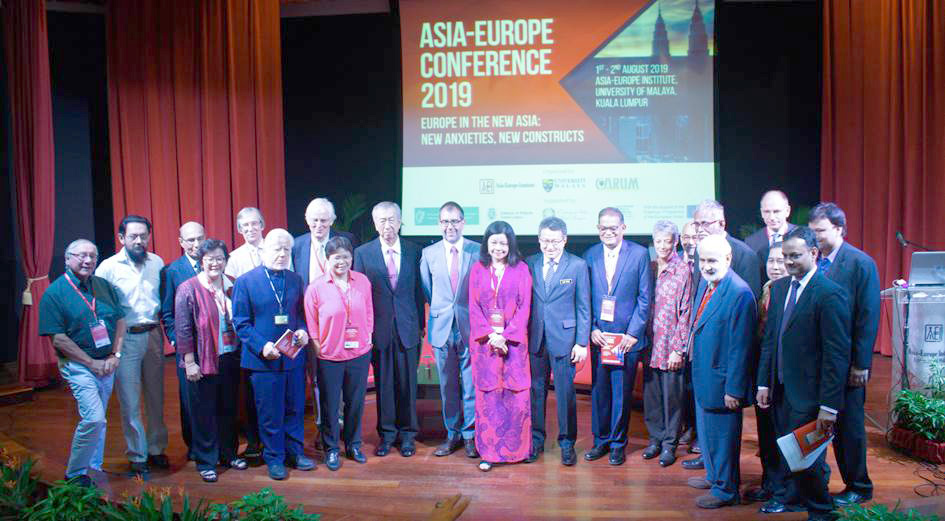 All the speakers and panellists together with Prof. Dr. Azirah Hashim (11th from the left) and YB Senator Liew Chin Tong
All the speakers and panellists together with Prof. Dr. Azirah Hashim (11th from the left) and YB Senator Liew Chin TongThe first session was moderated by Professor Anthony Milner, Visiting Professor at the AEI and Co-Chair, Council for Security Cooperation in the Asia Pacific, who emphasized the need to trace the Asian contribution to the study of international relations. He highlighted that the non-western approaches to international relations are challenging the domination of the West, not just in power but in the ideas too. He quoted Wang Gungwu, former Professor of History at the University of Malaya, who has stressed that far from having universal validity, “the whole language of IR is such that anybody in Asia studying IR will attain an Anglo-American world view”. The session, said Professor Milner, aimed to delve deeper into the debates relating to western and non-western contributions to thinking about interstate behaviour.
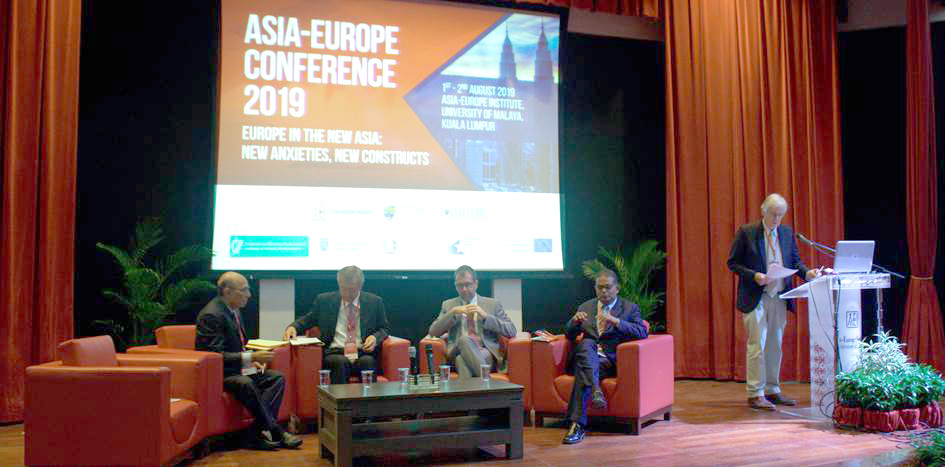 From left to right: Tan Sri Mohamed Jawhar Hassan, Ambassador Makio Miyagawa, Professor Sven Biscop, Professor Amitav Acharya and Professor Anthony Milner
From left to right: Tan Sri Mohamed Jawhar Hassan, Ambassador Makio Miyagawa, Professor Sven Biscop, Professor Amitav Acharya and Professor Anthony MilnerThe session began with the keynote speech by Professor Amitav Acharya, Distinguished Professor, School of International Service, American University, Washington DC, UNESCO Chair in Transnational Challenges and Governance, and one of the leading voices on non-western international relations. Prof. Acharya suggested the term ‘non-western’ is ill-defined and does not follow any particular model. Analysing the international liberal order, Prof. Acharya articulated that US President Donald J. Trump, who is pushing the international order to its edge, is a consequence rather than a symptom of an ongoing crisis of the liberal international system. Highlighting the key features of the contemporary world order, he argued that the world is getting interconnected and linked with growing contestations, which make it complex.
Tracing the origin of international relations, Professor Acharya mentioned that international relations as a field of study emerged in the United Kingdom in 1919 and was strengthened in the US. European approaches provided the mainstream template for the study of international relations, which are considered the dominant view even today. He emphasised that other civilizations e.g. China, India and Islam pioneered different international systems, and their contributions should be part of the study of international relations. Although the Chinese, Indian, and Islamic approaches were anti-colonial and pan-global in nature, Asian thinkers did not get the substantial attention and appreciation in the mainstream international relations. He pointed out that the discipline of international relations has been West-dominated where the non-West countries have been marginalised.
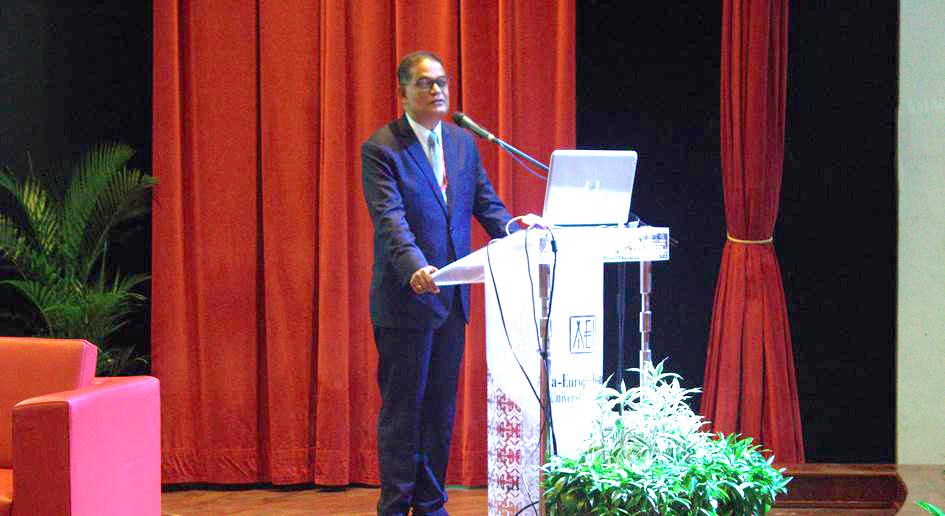 Professor Amitav Acharya, Distinguished Professor, School of International Service, American University, Washington DC
Professor Amitav Acharya, Distinguished Professor, School of International Service, American University, Washington DCProfessor Acharya argued that international relations in the West has been a field of study imbued with racism, geopolitics and imperialism. He added that there are three key factors driving the western domination in international relations: Institutions, publication, and gatekeeping. In many leading journals, the English language acts as a barrier because it is the “lingua franca” of research on international relations, which leaves little scope for other languages.
For instance, most of the publications on international relations from countries such as France, Russia, and the Arab countries are in the national languages of these countries rather than English, which is why the opinions of scholars from these countries are sidelined in the wider field of international relations. He said that another grave challenge faced by non-western scholars is that their works are not cited enough in the West-dominated academic publications. One positive development, however, is that the field of international relations is rapidly expanding at the global scale. In Malaysia, India, and Indonesia, for example, there are more than 80 departments where international relations is taught.
In that context, Professor Acharya highlighted the growth of the distinctive international relations approaches led by non-western countries such as China, India, Indonesia, Brazil, and Russia. This development, he explained, is different from the post-World War II order as it helps build bridges among countries.
Professor Amitav Acharya’s keynote speech was followed by a presentation delivered by Ambassador Makio Miyagawa, the Japanese Ambassador to Malaysia and former Director, Japan Institute of International Affairs (JIIA). In his presentation, Ambassador Miyagawa underscored the debates between leading approaches in international relations- between the West and non-West (or the East); and, confrontational approaches regarding the relations between the international or regional organizations. Ambassador Miyagawa stated that the Treaty of Westphalia, which governs the relations among the modern sovereign states, has been dominant in the West. The Westphalian principles, which originated in Europe, later spread to the non-Western regions and have been accepted by the non-Western states for the conduct of their relations with other states.
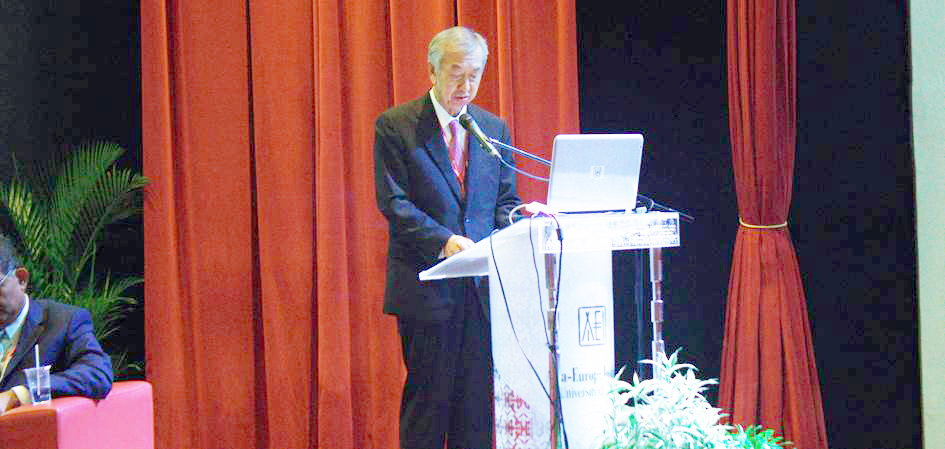 Ambassador Makio Miyagawa, Ambassador of Japan to Malaysia
Ambassador Makio Miyagawa, Ambassador of Japan to MalaysiaThe notions of the Westphalian treaty form the fundamental principles of international law which establishes the principle of equality amongst the sovereign states and non-interference in the internal affairs of a nation state as enshrined in the United Nations charter. According to this notion, every state should be treated equally irrespective of size and power. He, however, highlighted that China has stopped respecting the international norms. It expects smaller countries such as the ASEAN member states to align with China particularly on the issue of the South China Sea. According to Ambassador Miyagawa, such behaviour from China reminds scholars of the debates surrounding not only ‘sovereignty’ but also ‘suzerainty’.
Ambassador Miyagawa argued that in contemporary international relations, the difference between the western and eastern approaches is no longer manifested in the form of major power domination of the smaller nations. It is defined by the support developed nations extend to the weaker or developing nations particularly in the East. Citing the Asia-Pacific Economic Cooperation (APEC) as an example, he said that it can be seen as a case of confrontation between the principles of Western and Asian notions regarding the state-to-state relations. As per the Western principles of coexistence of sovereign states, all member countries in APEC should commit themselves to trade and investment liberalisation regardless of their economic size or stage of development. On the other hand, in the perspective of Asian values, economically dominant countries should accept that certain consideration needs to be given to the situation of weaker states – and support should be rendered, if needed.
He concluded by stating that in the aftermath of the Cold War, Asian regionalism is also on the rise, giving prominence to the non-western approaches to international relations.
Tan Sri Mohamed Jawhar Hassan, Senior Advisor at the AEI, and former Chairman and Chief Executive, Institute of Strategic and International Studies (ISIS) Malaysia, highlighted the factors shaping the Western and non-western approaches to international relations.
He emphasized the role played by the media and termed it as one of the most powerful tools in international relations. He said that the global media, driven largely by Western interests, shapes our world views and perspectives on issues. The CNN, BBC and the like on air, or Reuters and AFP in print and online, broadcast from a Western perspective and reflect Western interests. In many countries including Singapore and Malaysia, the local mainstream print and electronic media carry content from Western news sources and rarely if ever carry even occasional news, say, from the Xinhua News Agency, TASS, or IRNA. The selection of events and actions that are considered newsworthy, and the way they are reported, are heavily influenced by the West and its interests and values.
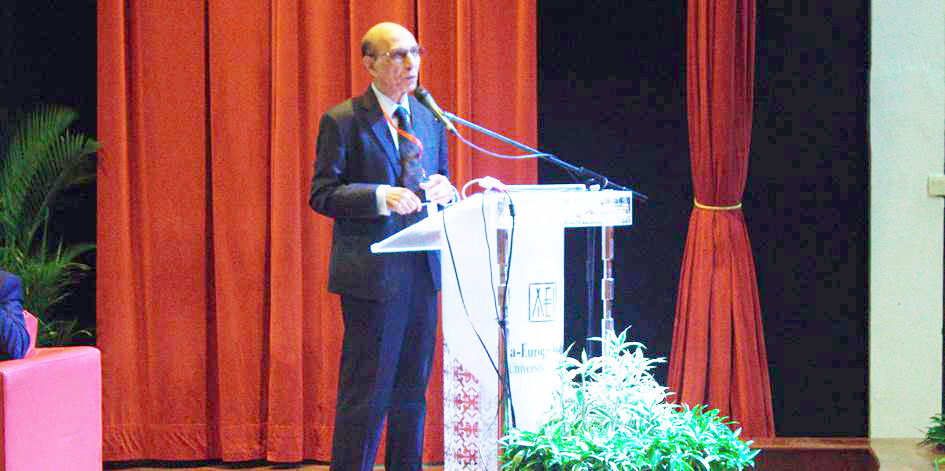 Tan Sri Mohamed Jawhar Hassan, Senior Advisor at the Asia-Europe Institute
Tan Sri Mohamed Jawhar Hassan, Senior Advisor at the Asia-Europe InstituteTan Sri Jawhar observed that distinguishing between the Western and non-western approaches to international relations is difficult because in history, both actors (Western and non-western countries) often acted alike in the international arena. Self-interest has been a common factor driving their interests since centuries. He further argued that the Western approach to international relations became predominant with the beginning of imperialism. Since Europe took over the rest of the world by force and guile beginning the 15th century, the Western approach has also become, to all intents and purposes, the non-Western approach. This became especially evident from the 17th century, when the European states adopted the Peace of Westphalia treaties in 1648. Virtually all states have adopted the Western Westphalian blueprint of relations among states since, though of course with some differences to suit local strategic environments, cultures and experiences. All states, both of the West and the Rest, are now part of the United Nations system and have adopted the UN Charter and its principles of international relations. The principles are routinely reiterated in regional instruments.
He further stated that, the impulse to make the world safer and more just for all is a powerful force. It will not be denied, as the experience especially since the founding of the United Nations has shown. Significantly, non-state actors within states and networked across countries have become key agents pressing for change, whether it be as regards arms, food, essential needs, humanitarian disasters or a livable and sustainable environment.
The rise of non-government movements as important international actors alongside states is of profound significance, for the turf is no longer monopolized by the latter. Non-government bodies are less susceptible to the practice of larger states applying persuasion and coercion on other states to desist from participating in initiatives that are deemed counter-productive to their self-interest.
Professor Sven Biscop from the Egmont Institute, Belgium, spoke on Western approaches to international relations. He argued that the contemporary debate in Europe is transcending the notion of the Westphalian system. He argued that the idea of pooling sovereignty among EU member states has been stretched a little too far.
The idea of civilian power, which seems to indicate that the members of the European project have somehow abjured the idea of military force, is a fallacy as among the EU member states, which is manifested in the existence of NATO even today.
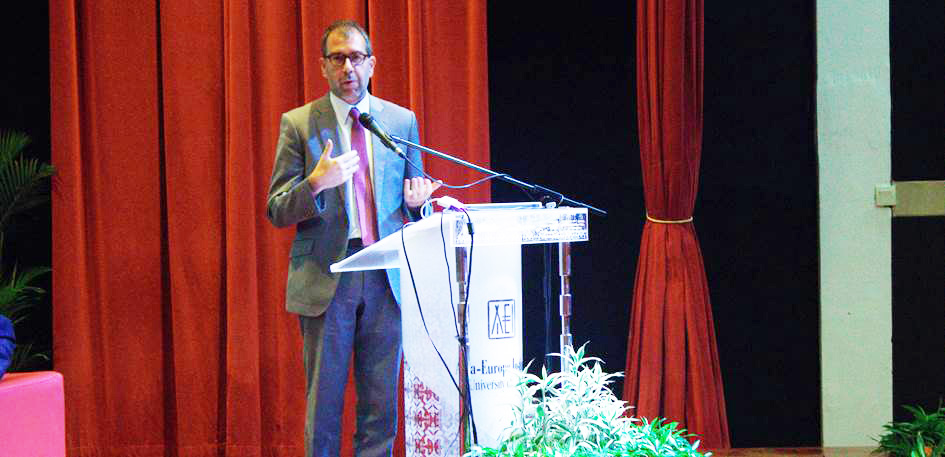 Professor Sven Biscop, Egmont Institute, Belgium
Professor Sven Biscop, Egmont Institute, BelgiumHe pointed out that since the end of the World War II, there has been no intra-continental war in Europe, which made the traditional concepts of geopolitics redundant. Nevertheless, as Europe is coming to grips with old concepts of international relations, it has to understand the grand strategy of states and set its approaches vis-à-vis great-power rivalry and act in a different manner.
Prof. Biscop argued that successive crises around Europe in recent years has exposed the continent to the dark side of power politics. contemporary European debates strive to come to terms with such supposedly old-fashioned concepts of power politics and geopolitics. The Russian - Georgian war in 2008, the Arab spring, and the Russian aggression against Ukraine in 2014, changed the nature of foreign policy debates in the Eurozone.
For Europe, which is under the US security umbrella, strategic autonomy is pushed to the margins. He stated that the foreign policies of the European nations need to be more pragmatic and realistic. For years, Europe has been trying to apply its own definitions and model of democracy, rule of law, and human rights. That policy, however, is not working anymore.
Prof. Biscop concluded by saying that rather than sticking to its current foreign policy approaches, European countries should focus more on commonly agreed interests and more dialogue mechanisms.
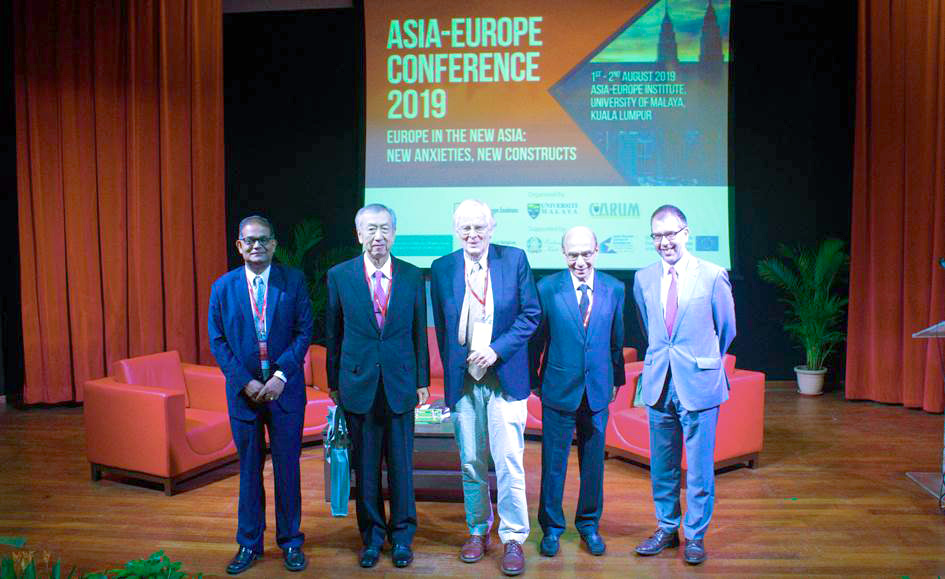 Session 1 panellist - (from left to right) Professor Amitav Acharya, Ambassador Makio Miyagawa, Professor Anthony Milner , Tan Sri Mohamed Jawhar Hassan and Professor Sven Biscop
Session 1 panellist - (from left to right) Professor Amitav Acharya, Ambassador Makio Miyagawa, Professor Anthony Milner , Tan Sri Mohamed Jawhar Hassan and Professor Sven BiscopChaired by Dr. Jatswan Singh, Deputy Director, AEI, the second session started with a keynote presentation by Mr. Enrico Letta, former Prime Minister of Italy, Dean of the Paris School of International Affairs, Sciences Po and President of the Jacques Delors Institute. In his presentation, Mr. Letta highlighted that the Asia-Europe relations have advanced in the past few years. There are striking similarities between Asia and Europe.
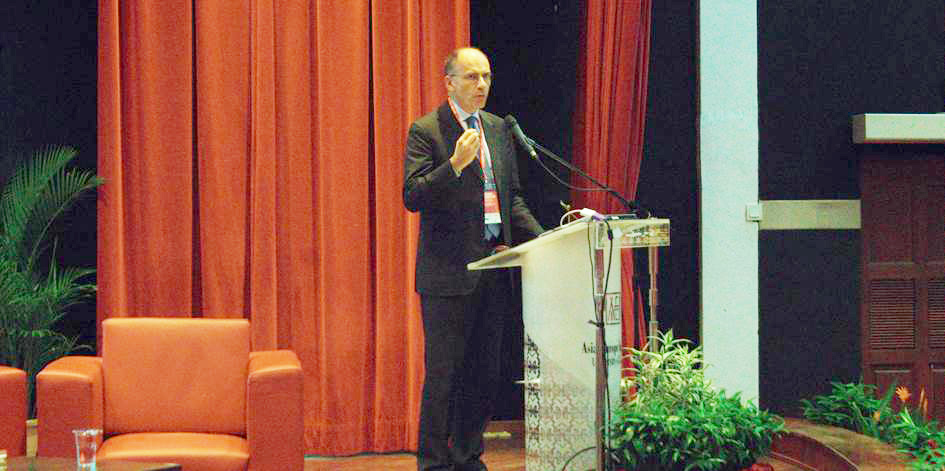 Mr. Enrico Letta, former Prime Minister of Italy, Dean of the Paris School of International Affairs, Sciences Po and President of the Jacques Delors Institute
Mr. Enrico Letta, former Prime Minister of Italy, Dean of the Paris School of International Affairs, Sciences Po and President of the Jacques Delors InstituteHe highlighted five key security issues critical for both Asia and Europe. Of all the issues, according to him, cyber security is the most critical security challenge. He highlighted that today, companies such as Huawei, Google, Facebook, Apple and Alibaba are playing pre-eminent roles in shaping the public debates. He said that ensuring cyber security is one of the primary objectives for the EU and it is investing resources in data and privacy protection. He advocated a greater role for Asian countries and cooperation among the Asian and European countries in addressing the cyber security challenges.
Mr. Letta pointed out that the second challenge is ensuring financial stability. He emphasised that greater financial cooperation and financial management is needed to avoid any future financial crises in Asia and Europe. Financial institutions play a critical role in ensuring stability, which is why the contributions of cooperative Asian regional institutions and ASEAN is crucial. As one of the leading supporters of the G20, Mr Letta stated that G20 is one of the effective platforms to discuss important aspects of the globally prominent institutions. He added that the G20 should strengthen its role in facilitation of regional integration especially with regard to the ASEAN.
Mr. Letta listed terrorism as the third challenge to security in Asia and Europe. Terrorism has emerged as a grave threat to both Asia and Europe, and therefore, it is imperative for ASEAN and EU to share information and technological knowhow to deal with the menace of terrorism.
The fourth challenge, according to Mr. Letta, is the human rights violations by state actors. He highlighted that human rights protection is one of the core issues in intra-EU relations, and is an important element of the European foreign policy. Mr. Letta called lack of collective and coordinated response to trans-national challenges the fifth key security issue. He emphasised the need to find “multilateral solutions to multilateral challenges”. He believed that these could play an instrumental role in dealing with trans-national challenges such as migration and climate change.
Mr. Letta’s keynote address was followed by a presentation by Dr. Farish A. Noor, an Associate Professor at the S. Rajaratnam School of International Studies (RSIS), Nanyang Technological University, Singapore. Dr. Noor pointed out that there exists a gap between the verbal discourse on ASEAN construct and the reality on the ground. According to him, the colonial vocabulary still dominates the discourse in the ASEAN region and it is very difficult to get past the Western narrative and create a regional narrative.
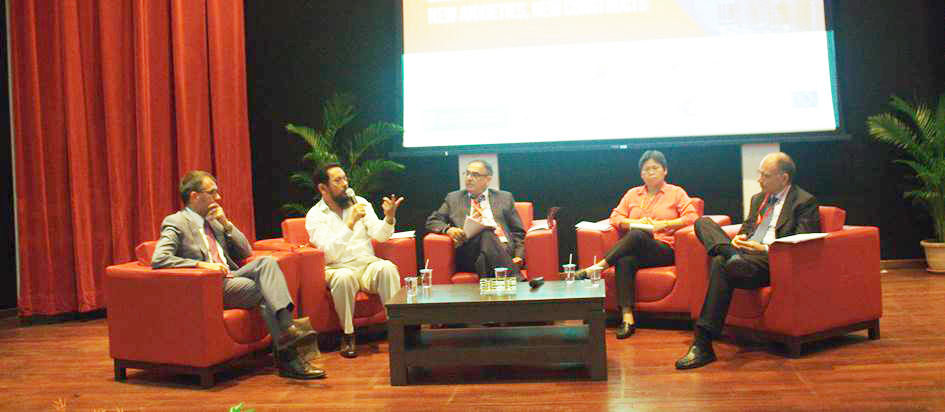 From left to right: Professor Sven Biscop, Dr. Farish A. Noor, Dr. Jatswan Singh, Dr. Yeo Lay Hwee and Mr. Enrico Letta
From left to right: Professor Sven Biscop, Dr. Farish A. Noor, Dr. Jatswan Singh, Dr. Yeo Lay Hwee and Mr. Enrico LettaHe said that notwithstanding the forces of globalization that are upon us, we cannot and should not assume that all of this will lead us to singularity or homogeneity in international politics. It is undeniable that we live in an age where connectivity and the global communicative architecture we have built has brought us closer together, but it would be a mistake to assume that the world is flattening out and that the problems and issues that the EU has to grapple with are the same as the challenges faced by ASEAN. Though both the EU and ASEAN are regional groupings, their similarities end at the level of the nominal and the two are very different entities with histories of their own.
Dr. Noor argued that the post-Colonial state is built on the foundation of the colony. All modern post-colonial states have inherited the epistemologies, vocabularies, perspectives, and disciplines, including international relations, of the colonial states, which bring in all those inherent colonial biases in defining the contours of security for the region. This leads to the discrepancy between the way in which technocrats, academics and scholars talk about ASEAN as a construct among the states, and the reality on the ground- how it is perceived by common people of the ASEAN region.
He argued that one of the ways to deal with such a challenge could be to bridge the gaps between the perception of the common people and the policy-makers and academicians.
Dr. Noor said that from the Southeast Asian point of view, security is always understood in terms of human security and societal security. It is imperative to change the discourse and encourage ASEAN to take a bigger role in tackling issues such as climate change. He added that for ASEAN states issues such as climate change should be at the top of their comprehensive security agenda.
Professor Sven Biscop, the third speaker for the session, spoke on current developments in European and Asian Security Architecture. He said that the course of world politics is, to a large extent, determined by the interaction among the great powers. It is the great powers and their pursuit of self-interest that shape the current world order. He argued that for the first time since the end of the World War II, Europe has become the “second front” for the US. The US foreign policy is driven by the understanding that Europe is needed in dealing with China. However, Europe must think for itself and decide its priorities based on its own self interests.
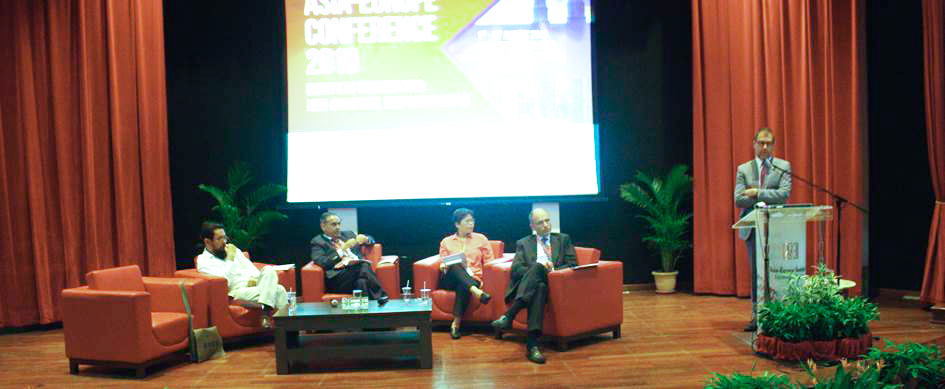 From left to right: Dr. Farish A. Noor, Dr. Jatswan Singh, Dr. Yeo Lay Hwee, Mr. Enrico Letta and Professor Sven Biscop
From left to right: Dr. Farish A. Noor, Dr. Jatswan Singh, Dr. Yeo Lay Hwee, Mr. Enrico Letta and Professor Sven Biscop Professor Biscop analysed the security architectures in Asia and Europe at three levels. The first level, according to him, is that of Europe-China engagement, and their strategies and interactions with each other. As a major power, China pursues its interests; so does Europe. Both China and Europe work within the overall framework of cooperation. In that context, the relationship between China and Europe has been stable and is marked by high degree of trade dependence.
Prof. Biscop said that Europe should work with China wherever it is possible, but must be ready to push-back where its values and interests are not in alignment with China. “Cooperate when you can; push-back when you must” should be the overall guiding principle for Europe in dealing with China.
The second level of engagement is Europe’s strategy vis-à-vis Asia as a whole. Rise of China has opened both opportunities and challenges for countries within Asia and beyond. Prof. Biscop argued that while it is in the interest of Asia and Europe to have a strong trade relationship with China, it is advisable to not get overdependent on China. Comparing with China’s BRI, he said that to what extent Europe is ready to use its resources in developing infrastructure and connectivity will shape Europe’s engagement with the Asian countries.
The third aspect is security within the EU. Europe has to first put its own house in order before it attempts to effectively deal with China. As a political entity, the EU has to make sure that it overcomes hurdles in decision-making. Prof. Biscop suggested that “majority voting” must be introduced in the EU for faster decision-making on all issues including diplomacy. On the military aspect, Europe needs to develop a certain degree of autonomy so that it can project its presence in Asia and elsewhere. He argued that a well thought-out and comprehensive European strategy is needed to engage Asia.
Dr. Yeo Lay Hwee from the EU Centre, Nanyang Technological University, Singapore, raised two key questions in her presentation:
She responded to these questions by stating that all institutional mechanisms in ASEAN such as the ASEAN Regional forum, East Asia Summit, and ASEAN Defence ministers Meeting Plus are still used to address the security challenges in the region.
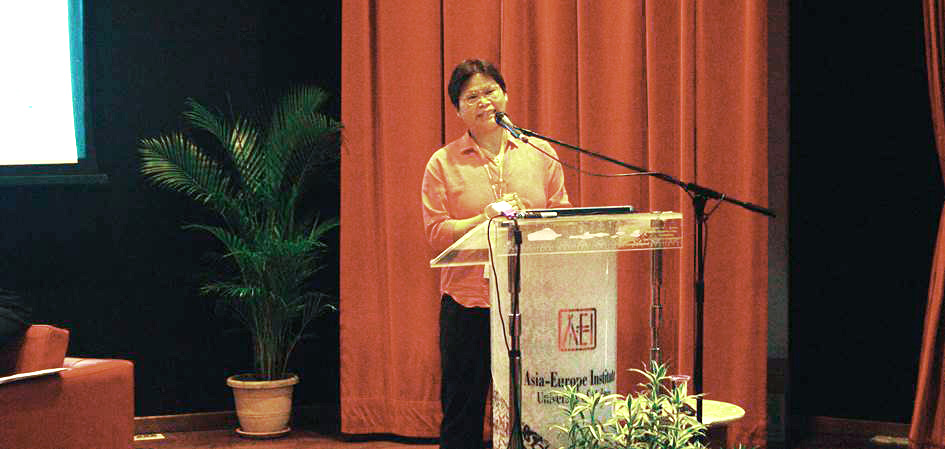 Dr. Yeo Lay Hwee, EU Centre, Nanyang Technological University, Singapore
Dr. Yeo Lay Hwee, EU Centre, Nanyang Technological University, SingaporeDr. Yeo highlighted that by inviting the new countries in their respective regional mechanisms, both ASEAN and EU have become more diverse in terms of interests and perceptions.
However, she emphasised that both the EU and ASEAN have to keep in mind that unity is the most important objective. The EU and ASEAN should seek new ways of working within the already existing institutional framework rather than creating new mechanisms.
Dr. Yeo stated that the relationship between the EU and the ASEAN has never been really optimal and has ebbed and flowed. However, she remarked that the EU’s relations with Asia have been on an upward swing in the past two years and that the role of institutions is important in building bridges between Asia and Europe in general, and ASEAN-EU in particular.
Dr. Yeo concluded by stating that ASEAN and EU should work together to address the issues such as climate change, migration and cyber security.
Dr. Jatswan Singh concluded the session by stating that the institutions must work on strengthening regional cooperation efforts. Asia and Europe can learn from each other in dealing with their respective challenges. Malaysia too can contribute in that regard.
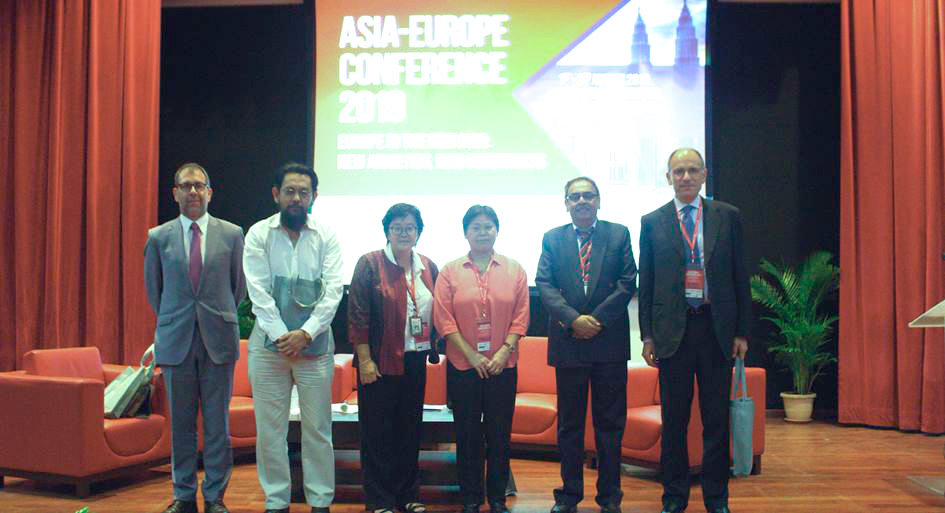 Session 2 panellists together with Prof. Dr. Sarinah Low, Deputy Executive Director (Research & Internationalisation) of AEI (3rd from left)
Session 2 panellists together with Prof. Dr. Sarinah Low, Deputy Executive Director (Research & Internationalisation) of AEI (3rd from left)The session was moderated by Professor Johan Saravanamuttu, Adjunct Professor at AEI. The first speaker was Dr. Ngeow Chow-Bing, who gave a presentation on “Creative Making of Regions and International Organizations: Cases of Shanghai Cooperation Organization and Belt and Road Initiative”.
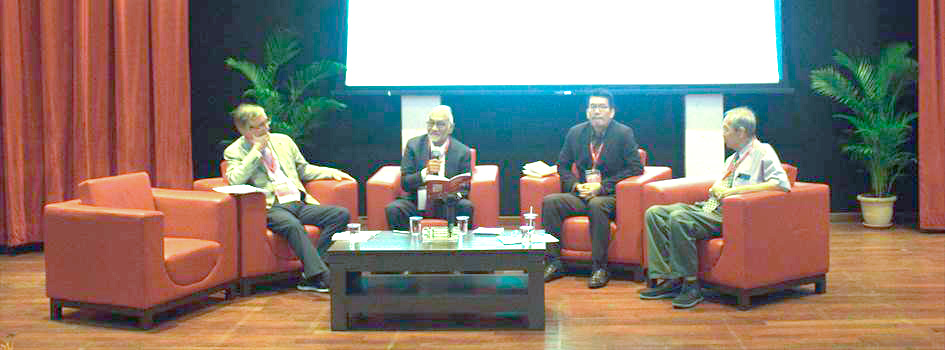 From left to right: Dr. Brian Bridges, Professor Johan Saravanamuttu, Dr. Ngeow Chow-Bing, Dr. Cheong Kee Cheok
From left to right: Dr. Brian Bridges, Professor Johan Saravanamuttu, Dr. Ngeow Chow-Bing, Dr. Cheong Kee CheokDr. Ngeow, who is currently the Director, Institute of China Studies at the University of Malaya, argued that in the past five years, the nature of China’s BRI has changed. BRI 1.0 was launched in 2013, and BRI 2.0 was marked by Xi Jinping’s speech in August 2018 in Beijing. BRI 2.0 has been an attempt to curtail the growing criticism of China and address the issue of transparency in the BRI. He added that the working principles of BRI are: ‘Extensive consultation, joint contribution and shared benefits’.
Dr. Ngeow further added that there is no blueprint for the BRI, neither is it based on international norms, but bilateral consultations - which if interpreted from the Chinese perspective, are meant to accommodate interests of individual countries. BRI is flexible in a sense that there are specific policies catering to a specific country’s interests. From the Chinese perspective, the BRI intends to address gaps in infrastructure and connectivity among developing countries, identifying new markets, and injecting new drivers of global growth etc.
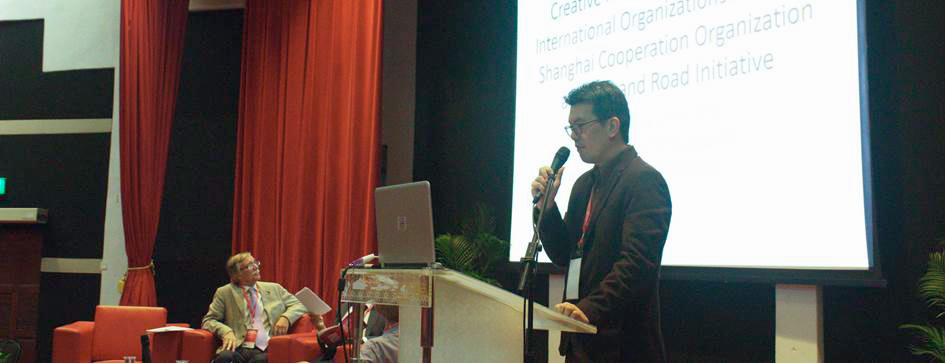 Dr. Ngeow Chow-Bing, Director, Institute of China Studies, University of Malaya
Dr. Ngeow Chow-Bing, Director, Institute of China Studies, University of MalayaHe noted that several foreign scholars believe that the launch of the BRI is attributed to geopolitical, geo-economics and Chinese domestic political economy considerations. Dr. Ngeow shared the major issues that Chinese domestic scholars are sceptical about. Most important, of course, is the debate whether the BRI is an economic initiative or a political Strategy. Dr. Ngeow argued that both SCO and BRI are projected as China-led and dominated groupings/initiatives. He called such moves by China its domestic ‘guerrilla-style policy-making’ and noted that they emphasised resilience, adaptability, hybridity, openness and inclusiveness.
Dr. Cheong Kee Cheok, Senior Advisor at the AEI and former Professor and Dean at the Faculty of Economics and Administration, University of Malaya, spoke on the linkages between Southeast Asia and the Shanghai Cooperation Organisation (SCO) and BRI in his presentation, titled “The SCO and BRI- Implications for Southeast Asia”. Dr. Cheong analysed the foundation, goals, and primary objectives of the SCO, which include cooperation on security-related issues, aiming to combat the three evils of terrorism, separatism and extremism. He then addressed the different objectives BRI intends to meet through its “Silk Road Economic Belt” and the “21st Century Maritime silk road”. Dr Cheong argued that together, the two components of the BRI are meant to create a new international order. He also highlighted the strategic and economic motivations behind the BRI, which are: To recreate a new China-centric international order and to search for new markets and keep state enterprises productively engaged.
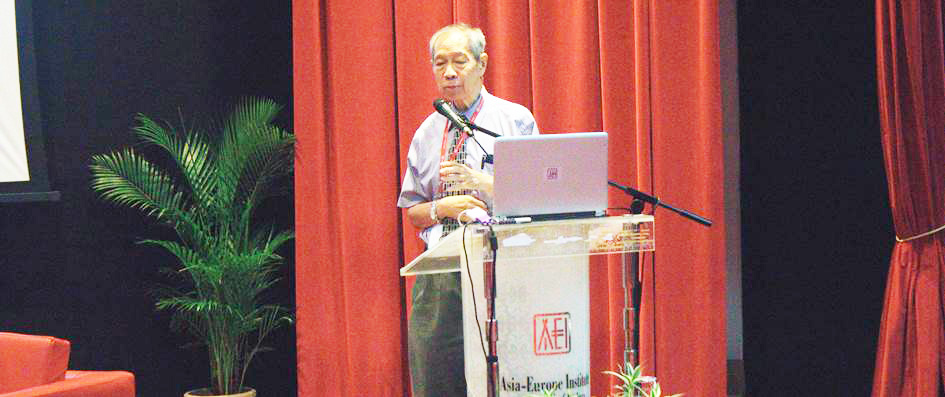 Dr. Cheong Kee Cheok, former Professor and Dean at the Faculty of Economics and Administration, University of Malaya
Dr. Cheong Kee Cheok, former Professor and Dean at the Faculty of Economics and Administration, University of MalayaDr. Cheong highlighted the impact of BRI on key Southeast Asian countries. He mentioned that obvious benefits of BRI included the much-needed infrastructure investment and the installation of technological ecology. He said that China’s OFDI, especially in state-to-state level investment has inadvertently encouraged alternative FDI from other “pushback” countries such as Japan and the US. BRI is not devoid of risks which include: financial burden, governance issues, and long-term impact on the global supply chain.
According to Dr. Cheong, the Southeast Asian region has seen large numbers of migratory flows that remitted substantial funds back to villages at home; these same migrants were instrumental in the growth of host-countries’ economies. He said that China’s BRI presents alternative and viable paths to development that are different from the “conventional wisdom” pitched by advanced nations and refutes the notion of a single path all countries must follow to achieve progress. In this sense, China’s many activities in the BRI represent important steps in the creation of a new international economic order. In essence, BRI is both a boon and bane for countries of the Southeast Asian region.
Dr. Brian Bridges, an Honorary Professor, Dept of Social Sciences, Education University of Hong Kong and an Affiliate Fellow, Centre for Asian Pacific Studies, Lingnan University, Hong Kong, assessed the BRI from a western perspective in his presentation entitled, “Europe and the Challenge of the Belt and Road Initiative”. He presented a brief historical overview of Europe’s increasing interest in Asia in line with its economic, political and security concerns in the ASEAN region. He highlighted that it was only after 2015 that Europe began to take interest in the BRI. However, there still is a lack of consensus with regard to the BRI in Europe. Dr. Bridges segregated European reactions to the BRI into four groups: The first is the group of countries, mainly from Central and Eastern Europe (CEE), which seem committed to the BRI project, expecting increased inflow of the Chinese investments via BRI. Countries such as Portugal and Italy belong to the second group, which are positive and open towards the BRI. These countries see potential commercial opportunities in working with China. The third group is defined by their wavering- but tipping to pragmatic- approach. This group primarily includes the United Kingdom, which recognises the importance of the BRI but is reluctant to fully commit itself to the project. The fourth group is represented by France and Germany, which support the BRI with a number of pre-conditions.
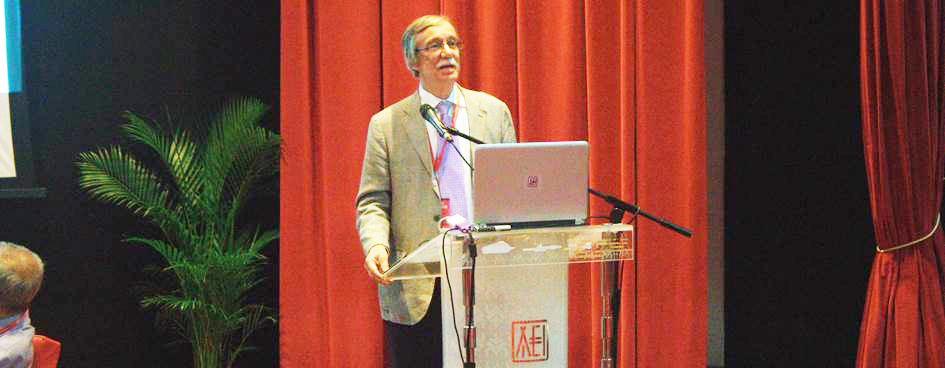 Dr. Brian Bridges, Honorary Professor, Dept of Social Sciences, Education University of Hong Kong and an Affiliate Fellow, Centre for Asian Pacific Studies, Lingnan University, Hong Kong
Dr. Brian Bridges, Honorary Professor, Dept of Social Sciences, Education University of Hong Kong and an Affiliate Fellow, Centre for Asian Pacific Studies, Lingnan University, Hong KongDr. Bridges concluded by arguing that Europe does not have a common and collective response to the BRI. Instead, a number of rather contradictory responses to China and BRI are emerging. This is not just because of the divergent country perspectives about the international order but is also due to external factors such as the role of the US. He concluded by stating that a post-Brexit EU, after the confusing and chaotic Brexit dramas of the past few years, will need to re-evaluate its place in the world and revive its global reputation for coherence. As part of such endeavours, nationally and at the EU level more resources will need to be devoted to understanding China and devising policies that express common European values in the Sino-European relationship. There should be a clearer set of priorities, focusing on a more limited number of issues but developing the responding policies in a more coherent and consistent manner. Without those developments, the BRI runs the danger of becoming a ‘one-way road’ to the benefit of China alone.
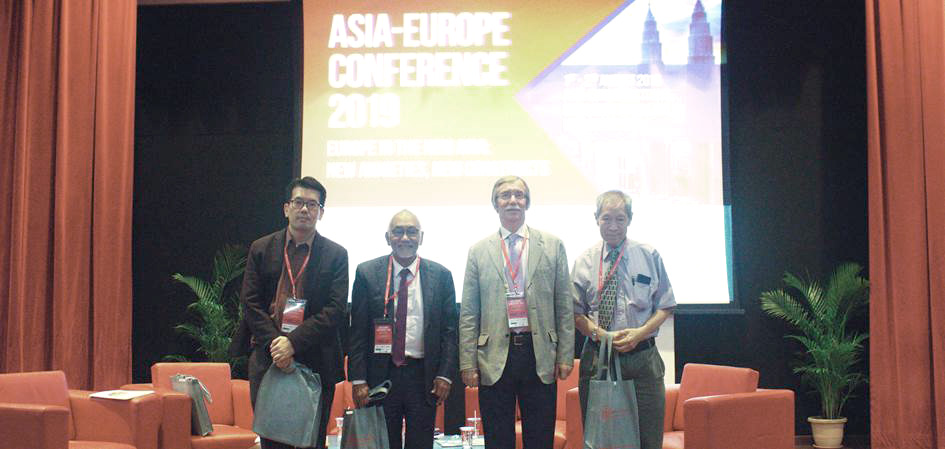 Session 3 panellists - from left to right - Dr. Ngeow Chow-Bing, Professor Johan Saravanamuttu, Dr. Brian Bridges and Dr. Cheong Kee Cheok
Session 3 panellists - from left to right - Dr. Ngeow Chow-Bing, Professor Johan Saravanamuttu, Dr. Brian Bridges and Dr. Cheong Kee CheokThe second day of the conference (August 2, 2019) began with a keynote speech by YM Raja Dato’ Nushirwan Zainal Abidin, who was Deputy Secretary General, Ministry of Foreign Affairs Malaysia and now Malaysia’s Ambassador to China. The session was moderated by Professor Raja Rasiah, Distinguished Professor at the University of Malaya. Prof. Rajah briefly highlighted the emerging contours of Malaysian foreign policy before inviting Dato’ Nushirwan for his keynote speech.
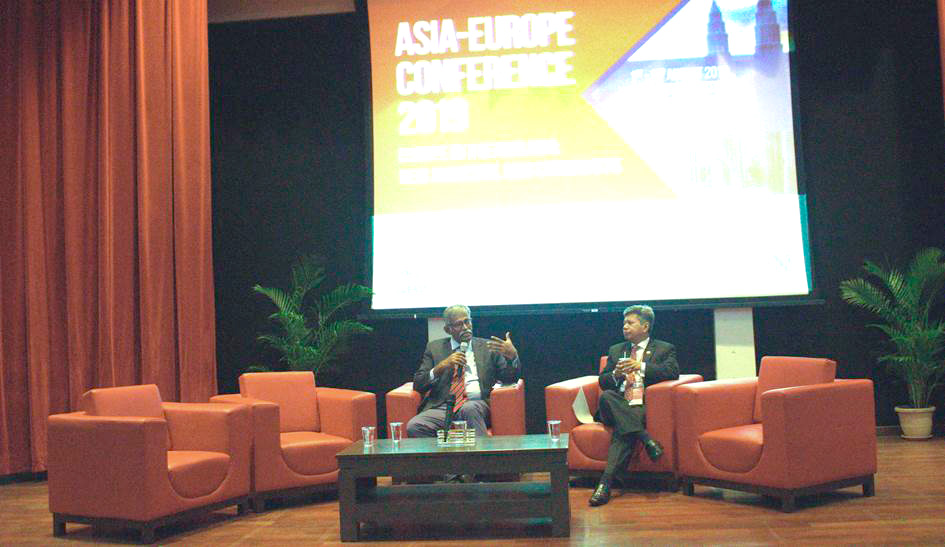 Professor Raja Rasiah (left) and YM Raja Dato’ Nushirwan Zainal Abidin (right)
Professor Raja Rasiah (left) and YM Raja Dato’ Nushirwan Zainal Abidin (right)In his keynote speech, Dato’ Nushirwan stated that it is fundamental to see that key regional players have a strategic balance to maximise their common strategic space. He added that Malaysia practices an open economy where one country is not favoured over the other. Dato’ Nushirwan reiterated that the international rules and order in the post-World War II world have largely been written by the US and Europe. Hence, the fraying of ties between the US and Europe will impact the international order in terms of its operations and fundamental ideas that it stands for. Dato’ Nushirwan expressed his concern that the developments surrounding the US-China relations have had such an impact on Southeast Asia. Calling for closer cooperation between Asia and Europe, he acknowledged that Asia [primarily the East] and Europe are not fully familiar with each other. He applauded the conference by stating that such initiatives would bridge the knowledge gap between Asia and Europe. He highlighted the need for Asia and Europe to work well together and learn about the cultures of each other.
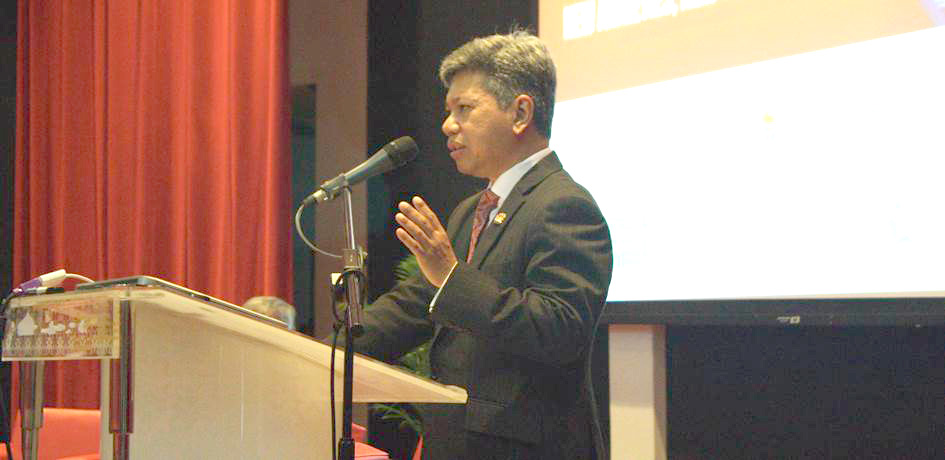 YM Raja Dato’ Nushirwan Zainal Abidin, Malaysia’s Ambassador to China
YM Raja Dato’ Nushirwan Zainal Abidin, Malaysia’s Ambassador to ChinaDato’ Nushirwan said that the Asian situation itself is not new - what is being witnessed is the re-emergence of the old East Asian order which pre-dates the Colonial era, and is characterised by the interdependence between China, India, and the Southeast Asian countries. The difference between the old Asian order and the new is the presence of the new actors in the region i.e. the US, Australia, New Zealand, and Europe among others. Dato’ Nushirwan advocated that these new players need to understand and adjust to how historically the Asian region functioned - especially with regards to the role of India and China in the contemporary setting and even in the emerging international order. He further made a reference to a recently published article by Carl Bildt, former Prime Minister and Foreign Minister of Sweden and the co-chair of the European Council on Foreign Relations. In his article Bildt argues that “China, that used to be a benevolent trading partner, is now an assertive promoter of its own ambitions”. While Bildt framed the rise of China as a challenge to the EU, Dato’ Nushirwan took the view that the transition of China to become one of the new great powers is a natural phenomenon.
He also pointed that the non-Western countries too have ambitions and that countries such as China are in a position to exercise their powers to achieve their global ambitions. Highlighting the commonly-held view that the East Asian countries are merely passive recipients of the projections of western powers, he stressed that it is not the case for Malaysia. He added that Malaysia deals with other countries on the basis of mutual benefit.
He stated that it is important for all to accept the reality in order to alleviate anxieties that may be present when dealing with the Asian region. He further stressed that there is no need for a new construct or new architecture - rather we must build on existing realities and mechanisms and tweak them to cope with new global realities. In that context, he spoke about the ASEAN ‘Outlook on the Indo-Pacific’ and noted four key elements. It called for the:
Dato’ Nushirwan opined that personal diplomacy plays a huge role in foreign relations. He concluded his address by highlighting that the Malaysia-China relationship is built on mutual respect and benefits.
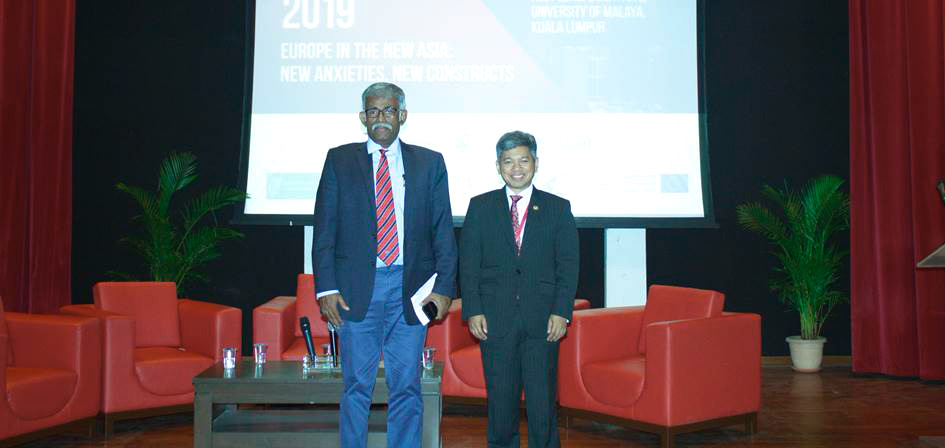 Professor Rajah Rasiah, Distinguished Professor, University of Malaya (left) as moderator and YM Raja Dato’ Nushirwan Zainal Abidin (right)
Professor Rajah Rasiah, Distinguished Professor, University of Malaya (left) as moderator and YM Raja Dato’ Nushirwan Zainal Abidin (right)The fourth session was chaired by Dr. Sharifah Munirah Syed Hussein Alatas, Senior Lecturer at the Universiti Kebangsaan Malaysia. The first speaker of the session was Professor S.D. Muni, Professor Emeritus, School of International Studies, Jawaharlal Nehru University, New Delhi, who spoke on Indian approach to the Indo-Pacific.
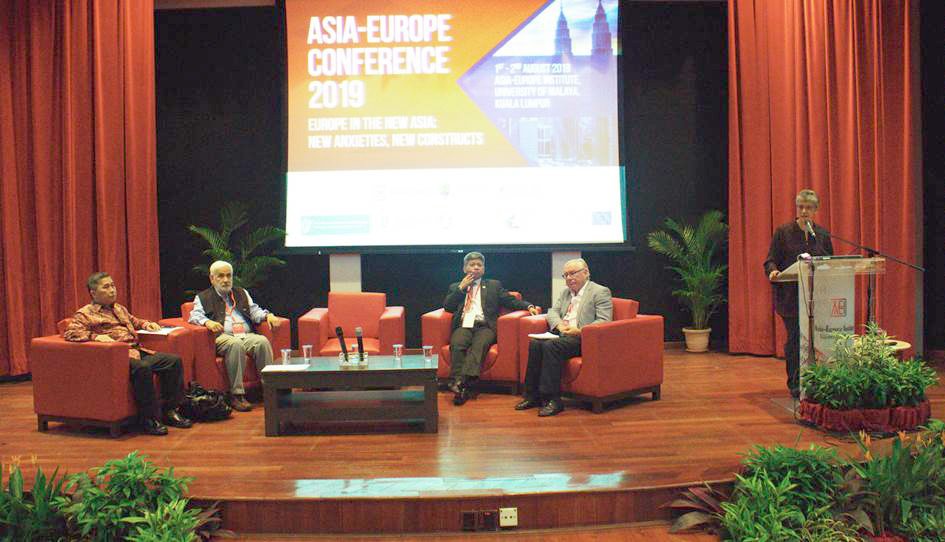 Left to right: Prof. Yanyan Mochamad Yani, Professor S.D. Muni, YM Raja Dato’ Nushirwan Zainal Abidin, Dr. Paul Gillespie and Dr. Sharifah Munirah Syed Hussein Alatas
Left to right: Prof. Yanyan Mochamad Yani, Professor S.D. Muni, YM Raja Dato’ Nushirwan Zainal Abidin, Dr. Paul Gillespie and Dr. Sharifah Munirah Syed Hussein AlatasProf. Muni argued that the Indo-pacific is a geo-strategic and geo-political concept. All such concepts are destined to evolve gradually, and they are doomed to be dumped when they have served their purpose. He recalled that in Southeast Asia, several such concepts have come up earlier including Indo-China, Southeast Asia, and the Asia Pacific. He argued that like all other regional constructs, the Indo-Pacific too is a ‘work in progress’ whose evolution and growth remains to be seen.
Tracing the genesis of the Indo-Pacific, he said that Shinzo Abe, the Prime Minister of Japan, is commonly known to have pronounced the Indo-Pacific concept in 2007 but it was Commander Gurpreet Khurana - an Indian Navy officer - who used the term for the first time in the academic domain. Interestingly, the term was also mentioned in the Indian Maritime Doctrine, 2004. Prof. Muni argued that the idea of Indo-Pacific is not new in the Indian history. In fact, starting from the first to the fifteenth century, India was a major player in the region - now termed as the Indo-Pacific. So far as the strategic aspects are concerned, it was Jawaharlal Nehru, India’s first Prime Minister, who in 1944 mentioned the salience of India in the Indo-Pacific. He also mentioned that the origin and evolution of the Indo-Pacific are mentioned in his co-authored (with Dr. Rahul Mishra) book titled, “India’s eastward Engagement from Antiquity to Act East Policy”.
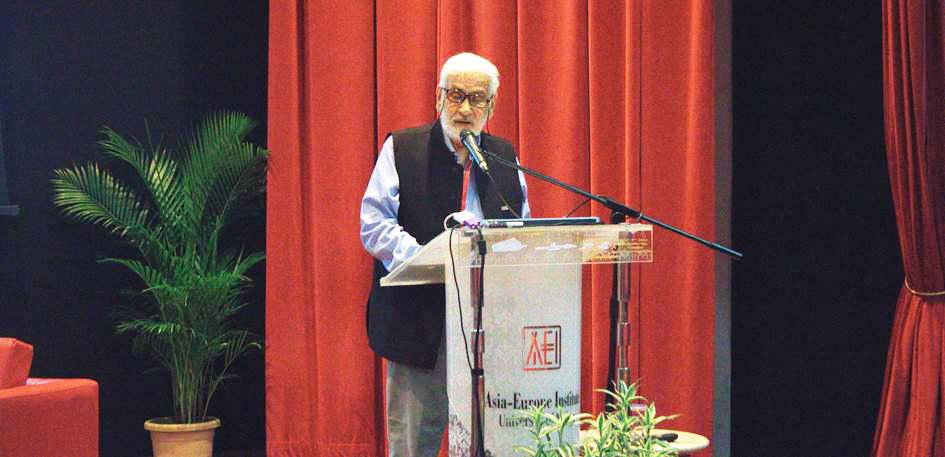 Professor S.D. Muni, Professor Emeritus, School of International Studies, Jawaharlal Nehru University, New Delhi
Professor S.D. Muni, Professor Emeritus, School of International Studies, Jawaharlal Nehru University, New DelhiHe listed the rise of China and increasing pressure on the US hegemony in the region as two major factors behind the rise of the Indo-Pacific. India fits very well in the US strategic design. He argued that the US has played a traditional balance of power politics in Europe putting the Europeans against the Europeans. He cautioned that the same might happen in Asia as well. One of the key points highlighted by Prof. Muni was that there is still no uniformity on the contours of the Indo-Pacific construct.
Prof. Muni concluded by arguing that the outcome of the Indo-Pacific concept would depend on two countries. First, the foreign policy behaviour of China, particularly its role in the South China Sea dispute and relations with major Asian countries such as Japan and India. Second, the questions about India’s willingness and ability to sustain the expectations out of it in the Indo-Pacific. He said that the strategic proximity between India and the US is actually in-depth- there is greater collaboration between the armed forces of the two countries, which will shape up India’s commitment to the Indo-Pacific. If these two issues are settled, the concept will prevail, otherwise it will fail to serve the purpose of countries of the region and will get dumped by both the policy makers and intellectuals.
Dr. Paul Gillespie, Adjunct Senior Research Fellow at the School of Politics and International Relations, University College Dublin and Deputy Director, UCD Institute for British Irish Studies (IBIS), presented the European perspectives on the Indo-Pacific. He argued that from the European perspective, there are several variants of the Indo-Pacific concept i.e. strategic balancing and practical orientations. Dr. Gillespie gave a brief overview of these concepts in order to suggest where the European interests might lie. Citing a Japanese commentator’s definition of the Free and Open Indo-Pacific (FOIP) as a policy “to keep the US in, China down and, ASEAN, India and Australia up in this new geopolitical space” as a frank and direct formulation of the strategy, he recalled a famous definition of NATO as an alliance “to keep Russia out, the United States in and Germany down” in Europe.
Dr. Gillespie said that the Indo-Pacific concept was in 2017 taken up by the US, Japan, India and Australia as an alternative strategic mapping of the vast region previously defined as the Indian Ocean and the Asia-Pacific. It was also due to the building up of concern about the rolling out and maturing of China’s hugely ambitious BRI on land and sea. Given that most of the world’s trade now passes through these regions (howsoever they are defined), these questions are important for states and organisations outside them as well. That is especially so for European states and the EU.
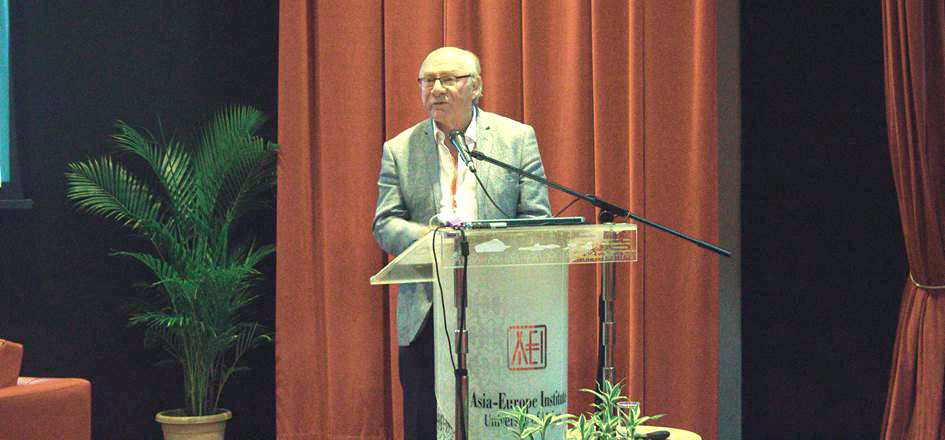 Dr. Paul Gillespie, Adjunct Senior Research Fellow, School of Politics and International Relations, University College Dublin
Dr. Paul Gillespie, Adjunct Senior Research Fellow, School of Politics and International Relations, University College DublinDefining the US as a regulatory and trade foe of the EU, he said that the relations between the Europe and the Trump administration have deteriorated due to Trump’s lack of commitment to multilateralism. He termed the Brexit as an opportunity to dismantle EU’s global rule-making and standard-setting power. USA’s withdrawal from the Iran nuclear deal and use of secondary sanctions against European companies have reinforced a feeling that the EU must now develop a stronger foreign policy regime. The newly appointed EU institutional leadership is being called on to create a strategic sovereignty dealing with economic issues including items such as investment screening and technology regulation. He said that more coordination is underway as part of a collective European response to threats, autonomous from the US and complementary to the NATO. He argued that geopolitical competition pushes the EU to protect its interests and values not only in Europe’s neighbouring Middle East and Africa, but further afield to engage with these Indo-Pacific developments. The EU is also developing a firmer engagement with China, not least because the BRI now includes 12 EU member and candidate states and increases competitive engagement in Africa. He argued that the EU has to balance these links with others, including Japan, India and the US, as other powers do. However, there is a better fit between EU and its policies than with the more exclusive and approached applied in this new Indo-Pacific region by the “Quad”.
Prof. Yanyan Mochamad Yani, Professor of International Relations and Head of Centre for Foreign Policy and Diplomacy Studies at Padjadjaran University, Bandung, Indonesia, was the last presenter at the conference.
Prof. Yani presented the Indonesian perspectives on the regional strategic environment and also gave an assessment of contemporary Indonesian foreign policy. He said that Indonesia’s most immediate environment is the Southeast Asian region, and ASEAN remains the cornerstone of the Indonesian foreign policy.
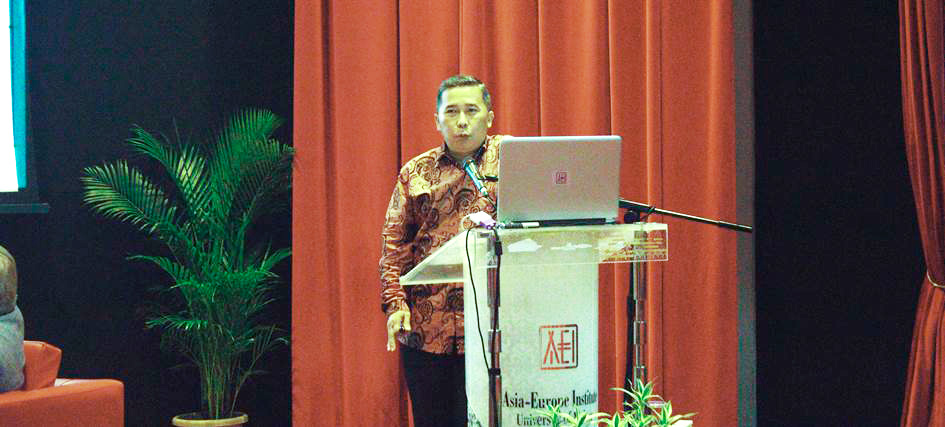 Prof. Yanyan Mochamad Yani, Professor of International Relations and Head of Centre for Foreign Policy and Diplomacy Studies at Padjadjaran University, Bandung, Indonesia
Prof. Yanyan Mochamad Yani, Professor of International Relations and Head of Centre for Foreign Policy and Diplomacy Studies at Padjadjaran University, Bandung, IndonesiaProf. Yani highlighted that recent years of Indonesian foreign policy have been marked by the desire to carve out a foreign policy in which Indonesia has “no enemies”, and to create strategic partnerships with certain key countries based on equal status, comprehensive cooperation, and long-term interests. Launched in 2014, the Jokowi Doctrine of Prime Minister Joko Widodo, pitches for friendship with all countries. According to the doctrine, until Indonesia’s sovereignty is degraded and national interest is jeopardised, Indonesia should not hesitate and should leave the tradition of deference to superiors.
He argued that the US influence and its strong military presence is a form of defence mechanism required to maintain stability in the Indo-Pacific. At the same time, ASEAN needs China’s economic momentum to survive. The new reality is that the region is witnessing the return of US and China’s military assertions. With the heightening of the US-China rivalry in the region, the ASEAN members are caught in a dilemma of choosing one major power over the other. Without a careful and clear policy, this dilemma can pose a new challenge to the already volatile region.
Prof. Yani argued that Indonesia needs a new framework of bargaining rather than balancing strategy to deal with the emerging security challenges in the Indo-Pacific region. He added that Indonesia must strive to build strategic partnerships with as many countries as possible so that it can overcome strategic challenges that might emerge in the region. Building such partnerships will also be in tune with the cherished goal of maintaining a free and active Indonesian foreign policy. He concluded by stating that Indonesia needs a more proactive foreign policy which can effectively deal with the rapidly changing external environment.
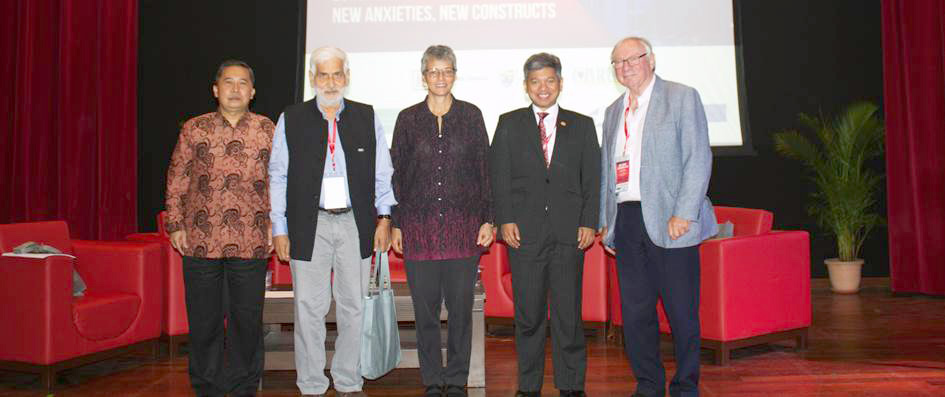 Session 4 panellist - from left to right - Prof. Yanyan Mochamad Yani, Professor S.D. Muni, Dr. Sharifah Munirah Syed Hussein Alatas (moderator), YM Raja Dato’ Nushirwan Zainal Abidin and Dr. Paul Gillespie
Session 4 panellist - from left to right - Prof. Yanyan Mochamad Yani, Professor S.D. Muni, Dr. Sharifah Munirah Syed Hussein Alatas (moderator), YM Raja Dato’ Nushirwan Zainal Abidin and Dr. Paul GillespieDr. Rahul Mishra, the Conference Coordinator and Senior Lecturer at the AEI delivered the closing remarks. Dr. Mishra highlighted the key academic takeaways of the conference based on the presentations of the speakers. He added that in view of the Trump administration’s erratic policies and China’s increasingly assertive foreign policy postures, it is evident that the “strategic holiday” for Europe is over and it has to play a more proactive role in the region. The conference ended with the vote of thanks given by Prof. Azirah Hashim.
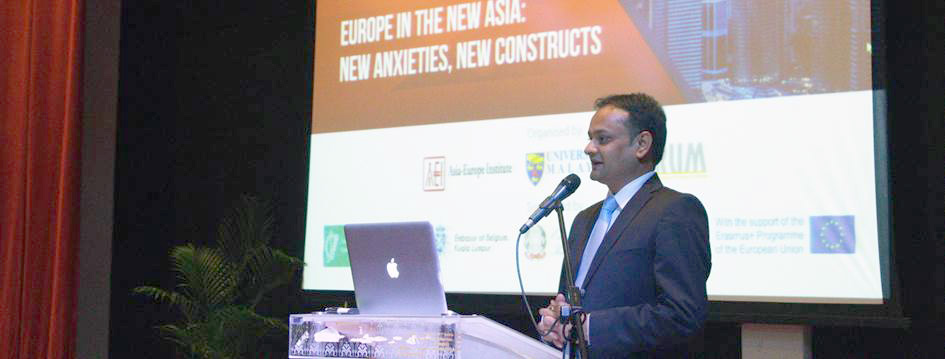 Dr. Rahul Mishra
Dr. Rahul Mishra-END-
Edited by: Prof. Azirah Hashim, Prof. Anthony Milner, Dr. Rahul Mishra
Rapporteurs: Ms. Marsha Prema Priya, Mr. Muhammad Hakim Nizam, Mr. Esmaeil Mazloomi, Sonny Lau, Mr. Nasser Salimi Aghbolagh, Ms. Kiran Kaur
Photos: Mr. G. M. Shafayet Ullah
Layout: Mr. Zahadin Omar
Last Update: 15/12/2021